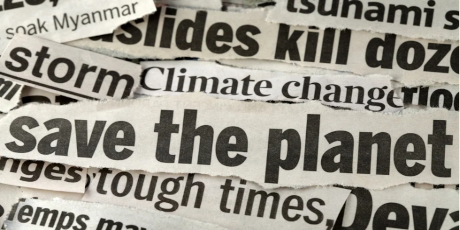What's in a name? Why 'global warming' became 'climate change' 14 Jul 2021

Opinion: the technical and scientific jargon around climate change may have evolved, but the problems and challenges remain - Dr. Paul Deane, Research Fellow, MaREI Centre for Marine and Renewable Energy, Environmental Research Institute (ERI), UCC
As the scientific understanding of the problem of climate change has evolved so too has the terminology used to speak about it. However, the solutions to climate change will require us to think differently and connect to what we value as a society.
Over 200 years ago, Carlow born scientist John Tyndall, made an important discovery in how water vapour and carbon dioxide absorb the sun's heat in the atmosphere. Years later, the term 'greenhouse effect’ was born. Greenhouse gasses are important for our survival on the planet. They help keep our planet warm by letting the sun's heat in and blocking some of it as it goes out.
But in the past 100 years or so, human activities have changed this natural balancing act. We have increased the levels of greenhouse gases in our atmosphere, mainly through the burning of fossil fuels, and caused a lot more heat to be trapped. This is changing our climate in ways we know are dangerous and the term 'global warming' was formalised in the 1980s to describe the impact on the earth’s surface temperature due to the increased level of these heat trapping gasses in the atmosphere.
From RTÉ Archives, Una O'Hagan reports for RTÉ News on the 1990 Earthwatch conference which found that government action is needed to protect Ireland from rising sea levels and violent storms caused by global warming
When discussions about this problem intensified and moved from the scientific realm to the public arena, it was seen that the term 'global warming' was not a helpful description as it tended to trigger thoughts about warming. But a changing climate doesn't just increase temperatures; it can also make our winters colder and storms more frequent and powerful. The term ‘climate change’ became more common as it reflects the long-term change in the Earth’s climate.
In scientific papers, ‘climate change’ is the term used more frequently today and scientists will use ‘global warming’ when specifically referring to the increase in the Earth's actual surface temperature. In the political sphere, the terminology has also evolved to reflect the urgency of the challenge and the need to have proactive approaches to solving the problem.
All this terminology reflects the scientific understanding of interactions between climate and physical processes. However, at a fundamental level, climate change is about people and how we as a society value our environment, our surroundings and our future.
From Royal Roads University, UN Special Envoy on Climate Change & Finance Mark Carney on how to build a climate resilient economy
Former governor of the Bank of England Mark Carney sees climate change as ‘a crisis of values’. He notes that much of what climate change will destroy, like wellbeing, clean air, biodiversity and resilience, is not valued in a formal manner. Carnet points out that our market society places a greater value on Amazon the company than the Amazon rainforest. The company is expected to be profitable into the future, while the rainforest region may only capture its value if cleared and farmed.
Our values are important when talking about the solutions to global challenges like climate change. In Ireland, the Covid crisis has revealed that we as a society value fairness, solidarity and care of the vulnerable. Public opinion surveys taken each week during the pandemic point to a higher degree of social concern for the health system and the safety of family and friends rather than our own personal health.
From RTÉ Radio 1's Drivetime, Philip Boucher-Hayes reports on the impact that the pandemic has had on climate change
A challenge in climate change messaging has been the emphasis on either dystopian narratives of societal collapse or utopian visions of perfect technology futures. There is also a tendency to focus on people’s belief in the problem rather than how our values as a society overlap with its solutions.
Addressing climate change means tackling problems that align with our broader values as a society and in Ireland three areas stand out. Energy poverty impacts 400,000 families who live-in poor-quality homes that leak most of their heat. Not only is this not fair, but it is bad economically and environmentally. Funding the retrofitting of these homes helps families and provides employment, health and positive climate outcomes.
Poor air quality contributed to the premature deaths last year of 1,300 people. This pollution is linked to heating systems that burn fossil fuels. Changing heating systems improves the lives of communities, protects the young and vulnerable and lowers emissions that heat the atmosphere.
From RTÉ jr's Ecolution podcast, an episode with the focus on air quality
Most families on smaller farms don’t earn a dignified living wage and produce volumes of low-cost food which pushes the environmental capacity of our land beyond its limit. Irish farms can produce food the world needs, but it must be produced in a way the world wants. The policies and support must be put in place to ensure it is sustainable from an environmental, social and climate point of view.
Addressing these challenges is hard, but linking solutions to our values as a society, such as fairness, solidarity, and resilience, will increase our chances of success. The fairer a society is the more resilient it is and the better it is. While the technical and scientific jargon around the problem of climate change has evolved, the core of the solution is centred on what we value.